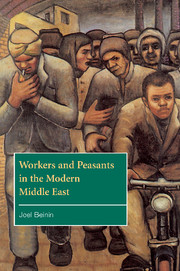Book contents
- Frontmatter
- Contents
- List of tables
- Acknowledgments
- Glossary
- List of acronyms and abbreviations
- Map 1: The Ottoman Empire, 1699–1914
- Map 2: Egypt and Bilad al-Sham
- Map 3: The Middle East in the twentieth century
- Introduction
- 1 The world capitalist market, provincial regimes, and local producers, 1750–1839
- 2 Ottoman reform and European imperialism, 1839–1907
- 3 The rise of mass politics, 1908–1939
- 4 Fikri al-Khuli's journey to al-Mahalla al-Kubra
- 5 Populist nationalism, state-led development, and authoritarian regimes, 1939–1973
- 6 Post-populist reformation of the working class and peasantry
- Notes
- References
- Index
Introduction
Published online by Cambridge University Press: 03 February 2010
- Frontmatter
- Contents
- List of tables
- Acknowledgments
- Glossary
- List of acronyms and abbreviations
- Map 1: The Ottoman Empire, 1699–1914
- Map 2: Egypt and Bilad al-Sham
- Map 3: The Middle East in the twentieth century
- Introduction
- 1 The world capitalist market, provincial regimes, and local producers, 1750–1839
- 2 Ottoman reform and European imperialism, 1839–1907
- 3 The rise of mass politics, 1908–1939
- 4 Fikri al-Khuli's journey to al-Mahalla al-Kubra
- 5 Populist nationalism, state-led development, and authoritarian regimes, 1939–1973
- 6 Post-populist reformation of the working class and peasantry
- Notes
- References
- Index
Summary
The working people who constitute the majority of any society can and deserve to be historical subjects. Many aspects of their lives can not be represented by the methods typically deployed to write histories of the political activities and ideas of elites and lettered classes. Investigations into the experiences and consciousnesses of working people cannot retrieve their “true” voice and should not aspire to remake them into the universal subjects of history. But such investigations can tell us many important things about common people and their position in society. Rethinking historical understandings from these premises can demarcate the limits of the powers of states and other institutions of authority and discipline or the ideas of elites and their organic intellectuals. It can also reveal relations of hierarchy and power, processes by which they are established and maintained, and instabilities, tensions, and struggles within societies.
Until the late 1970s most histories of the Middle East took as their subjects either the religious, legal, philosophical, and literary texts of Islamic high culture or the political histories of states. Concentrating on such topics virtually ensured that peasants, urban artisans, small merchants, service workers, and slaves were peripheral to the main concerns of “history.” The rare appearances of common people in historical writings were usually refracted through the vision of elites or intellectuals close to them, who had an interest in obscuring prevailing social hierarchies and discourses of power.
- Type
- Chapter
- Information
- Workers and Peasants in the Modern Middle East , pp. 1 - 20Publisher: Cambridge University PressPrint publication year: 2001
- 1
- Cited by

